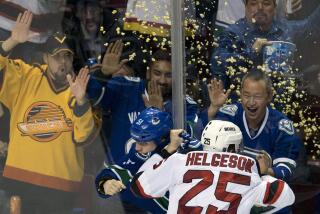THE NHL : Shootout Would Give Fans Money’s Worth
- Share via
Shootout.
The word conjures up images of dramatic finishes and legendary games.
Indeed, those who were in Meribel, France, last week for Canada’s shootout hockey victory over Germany in the Winter Olympics talked about the hushed crowd as the drama unfolded, about tension so thick it was hard to catch one’s breath.
The father of Canadian goalie Sean Burke was so nervous, he left the arena and was walking the streets while his son was saving Canada’s hopes.
That was the first time the shootout was used as a tiebreaker in the Olympics. Under that format, a game that ends in a tie is followed by 10 minutes of sudden-death overtime. If there is still a tie, each side gets five shots in the shootout, which consists of a skater going one-on-one against a goalie, as is done in a penalty-shot situation in the NHL.
If the sides are still tied after the five-man shootout, it comes down to a sudden-death shootout, each side getting one shot until there is a winner.
The Canadians had to go into the sudden-death shootout to beat the Germans.
Great hockey. But great enough for the NHL?
Why not? The Kings have already played 13 ties this season, leaving 13 crowds with the feeling they paid a lot of money for a game without a resolution.
In the postseason, NHL teams play to a conclusion, regardless of the number of overtimes required. But that’s not practical during the regular season, when players are already pushed to their physical limits by an 80-game schedule, sometimes involving back-to-back games in different cities.
At first, games ending in a tie after 60 minutes simply stayed that way.
Then, the NHL bent a bit and permitted the present five-minute, sudden-death overtime before settling for a tie.
Now, Marcel Aubut, president of the Quebec Nordiques and the man who pushed through the five-minute overtime, is going to try and do the same thing with the shootout.
The best argument against the shootout is that it has nothing to do with hockey. It would be like deciding a basketball game with a free-throw shooting contest, a football game with a field-goal kicking competition or a baseball game with a home run derby.
That may be, but all those sports, with the exception of a rare football game, get a winner and loser.
Besides, the comparison with other sports doesn’t hold. The shootout might not be pure hockey, but it does combine two of the key elements of the sport--offense and goaltending.
Soccer has successfully used the shootout format, and hockey is even better suited because it is more difficult to score a goal on ice, thereby creating more uncertainty, more tension.
“I don’t think I’d be in favor of it,” King owner Bruce McNall said. “Unless the fans really go crazy for it. Then maybe we should consider it. But you’d be going against tradition by eliminating the point system.”
That is true. The NHL’s unique standings, based on a point for a tie and two for a victory, would go by the wayside.
Teams could get to the top only by winning the most games. What a radical idea that is.
Eric Lindros, who won the shootout for Canada, has derided the format, calling it “backyard” hockey.
The fans don’t seem to agree. They loved it in Meribel. They would love it in the NHL.
For a league dying to get more exposure and a better television contract, which would NHL officials prefer, fans leaving the arena with the excitement of a shootout or the boredom of yet another tie?
Does the answer seem obvious?
Don’t bet on it.
From too bad to coach to too good to believe: The surprising New Jersey Devils have moved into contention in the tough Patrick Division.
And leading the charge is Coach Tom McVie, who has become a contender for coach of the year.
That’s only because he had enough sense to turn down the chance to be the coach of another year.
The year was 1984.
“I’d been called up from the farm team in Maine to coach (the Devils) for the rest of the 1983-84 season,” McVie told the Winnipeg Free Press. “That summer, I told Mr. Mac (owner John McMullen) his team didn’t have any talent. I said it was so bad that, if I stayed, it wouldn’t be long before he’d have to fire me. I said I’d rather develop young players for the organization back in the American Hockey League.
“Mr. Mac just looked at me and said: ‘You mean you’d rather go back to Maine, earn half as much money and ride the buses for 20,000 miles?’
“When I said, ‘Yup,’ he just shook his head and said, ‘Tommy, you may be a good hockey man, but you’re not very smart, are you?’ ”
Depends on your definition of smart. McVie went on to coach in the minors, McMullen went on to struggle with the Devils, indeed firing a string of coaches, and the two are now reunited on a team battling for a Stanley Cup.
Led by a coach smart enough to fire himself.
More to Read
Go beyond the scoreboard
Get the latest on L.A.'s teams in the daily Sports Report newsletter.
You may occasionally receive promotional content from the Los Angeles Times.






